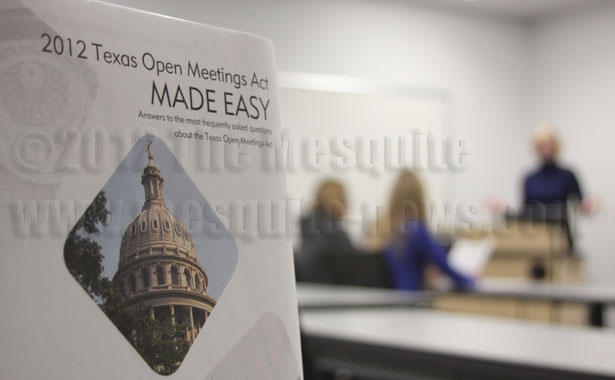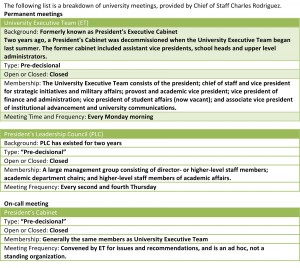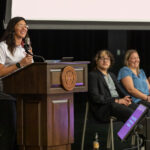
By Grace Newton
[accordions]
[accordion title=”The Texas Open Meetings Act“]The Texas Open Meetings Act was passed by the Texas Legislature in 1967 to make governmental decisions accessible to the public. It argues that governing bodies who receive public funds have a responsibility and obligation to the public to conduct business in the open.
As the student newspaper, we argue that it is important to know whether the Texas Open Meetings Act holds any relevance on our campus.
For the benefit of all students, we began our research on Sept. 25 when the Texas Open Meetings Act was upheld by the 5th U.S. Circuit Court of Appeals. The ruling was considered a victory for citizens and taxpayers wanting transparency in government and public institutions in the state of Texas.
The three-judge panel of the 5th Circuit Court of Appeals ruled against municipal officials from across the state who filed a lawsuit claiming that the act violated their first amendment rights.
The officials held public meetings behind closed doors and did not want to be held to criminal penalties outlined in the state’s open meetings law, which affirms that a violation is a misdemeanor and punishable up to a $500 fine and up to six months in jail.
In this commentary, our goal is to help the student body understand different interpretations of the Texas Open Meetings Act and present the topic in an open forum.
Should students have the right to know how administration, student government, senates and councils are making decisions that affect them, openly and behind closed doors?
As of now, students don’t know what decisions are being made and can’t know because administrative meetings at this university are closed to Student Government Association, the student newspaper, students, the majority of employees and the public.[/accordion]
[accordion title=”An open meeting: Good for students, headache for administration“]Here is an example of how open meetings have benefitted students on this campus: On March 23, a Mesquite reporter attended a then-open meeting of the President’s Leadership Council.
Following that meeting, The Mesquite reported an announcement made by Dr. Mary Ann Grams, former associate vice president for student affairs, who said the university was moving from a graduation ceremony in December and May, to a single ceremony in May.
This final decision was made by University Executive Team, made up of President Maria Hernandez Ferrier, provost, chief of staff and vice presidents, and was in response to student complaints about the limited number of tickets for guests at graduation ceremonies. Previously, the graduation ceremony was at Community Bible Church where limited seating was available, and students were allowed eight guests.
To accommodate a growing student body and more guests, administrators made the decision to move the ceremony to Freeman Coliseum, a larger venue at an increased cost. Because of the cost increase, the university decided to hold one ceremony instead of two.
In response, students planning to graduate in December were upset about having to tell their families there would be no ceremony.
After hearing from many upset students, administrators responded with a student survey followed by a SGA forum. Seven hundred students took the survey and 15 students voiced their opinions at the forum. Then, the decision was made to keep both a fall and spring graduation ceremony.
Marilu Reyna, associate vice president for institutional advancement and university communications, said at the April 10 forum that moving to one annual ceremony would not be taken off the table and she would recommend having one annual ceremony that would start in fall 2014.
Most view this as a positive outcome. The administration listened to student concerns and made a decision that benefitted students.
But let’s back up a moment. This all started because a student reporter was, by permission, allowed to attend and report on a meeting at a time when the university was new and still developing its communication strategy.
The administration was forming teams, committees and councils at the precise time it was being asked to determine which of those meetings would be open, or closed.
Because a reporter was present at an open meeting and reported on the announcement to eliminate the December graduation, students were informed and administration had the opportunity to respond.

Since that time, administration has reorganized in an effort to consolidate administrative functions on this campus, as reported by The Mesquite.
“The re-organization this past summer streamlined management groups from three permanent to two permanent, plus one on-call,” Chief of Staff Charles Rodriguez said by email.
The meetings of the two permanent groups — University Executive Team and President’s Leadership Council — are closed to students.
Another group, the President’s Cabinet only convenes when the University Executive Team commissions a recommendation on a specific issue, and is closed.
War Room meetings, conducted the first Tuesday morning of each month and weekly in December and August, are open to all faculty, staff and students.
In an interview last week, Reyna explained why the University Executive Team, President’s Leadership Council and President’s Cabinet meetings are closed to students.
“That’s not information that’s ready for general circulation,” Reyna said. “Those are pre-decisional meetings.”
But she encouraged students and reporters to attend the monthly War Room meetings.
“War Room meetings are post-decision meetings, and that is news and information to be shared,” Reyna added.
Keeping the graduation ceremony decision in mind, are students satisfied with being informed of only outcomes? Or, would the process be more effective if students were able to offer input on issues that are on the table before those outcomes are delivered? And more importantly, what does the law require?[/accordion]
[accordion title=”A closed meeting: A Georgia case study“]Luckily, student reporters aren’t the first to ask these questions. Students across the country are weighing the open/closed debate and looking at their own state open meetings laws to determine how they apply to campus meetings.
In Georgia, the attorney general recently overhauled the state’s open records laws and administrators at the University of Georgia are using the change as justification to close meetings.
The new state law allows a government agency to close portions of meetings where officials are discussing a document that is exempt from the public under the Open Records Act, according to the dailyreportonline.com.
The Red & Black, University of Georgia’s independent student newspaper, reported: “The University’s Office of Student Conduct has closed all formal student disciplinary hearings to the public based on Georgia House Bill 397, which they believe has overturned a 1993 Georgia Supreme Court opinion that stated all student judicial hearings and records are open to the public.”[/accordion]
[accordion title=”Conflicting perspectives on A&M meetings“]Our central question: Should meetings of administrators on this campus be open to students who are interested in knowing what decisions are being made on their behalf? And what about taxpayers wanting transparency and accountability from their public institutions?
The answers we received are conflicting. In short, it depends on whom you ask. Follow along:
Last month, an attorney in the Office of General Counsel for The Texas A&M University System who declined to be identified, said the Texas Open Meetings Act only applies to the Board of Regents but does not apply to any groups on this campus, including the president and her executive team.
He said the A&M System only recognizes the Board of Regents as a governing body.
We decided to do some more research. We called the Freedom of Information Foundation of Texas (FOIFT) and were offered a different interpretation.
“The Texas Open Meetings Act applies to the university in the same manner that applies to any other governmental body,” FOIFT attorney Thomas Gregor said. “Students should be aware of the fact that they have access to the decision-making process of the governing body of the university.”
So who is right? The grey area lies in the terms themselves. What constitutes as a governing body?
According to the Texas Open Meetings Act: “The act requires meetings of governmental bodies to be open to the public, except for expressly authorized closed sessions, and to be preceded by public notice of the time, place and subject matter of the meeting. The provisions of [the Act] are mandatory and are to be liberally construed in favor of open government.”
A governmental body is defined as “a board, commission, department, committee or agency within the executive or legislative branch of state government that is directed by one or more elected or appointed members.”
Does this definition apply to the decision-making bodies of this campus, a public university?
According to attorneys with both the Freedom of Information Foundation and the Student Press Law Center, meetings where policy and public funding are discussed should be open to the public.
Adam Goldstein, attorney advocate with the Student Press Law Center, explained that in order to determine whether or not a group meeting should be open and subject to the Open Meetings Act, we must identify what type of group it is.
If the group is a decision-making body that discusses public business or policy (use of taxpayer dollars), then meetings should be open to the public. If the group is just an advisory body or board, and does not have any decision making authority but makes recommendations to a governing body, these meetings are not subject to the act.
“If decisions are being made that affect your students and the public, then the public has a right to be there,” Goldstein said.
This raises the question of what types of issues are being discussed and determined within these administrative meetings.
When asked what authority the president and her team have regarding policy or money, the A&M System attorney said, “She (the president) has authority to spend to a certain level but the budget itself, the broad authority of what is going to be spent on what, has to go through the board once a year.”
He added that the president does make a lot of decisions but they are within the broad authority of the board.
It’s well established that advisory boards — groups such as Faculty Senate, Staff Council, Campus Activities Board and Student Government Association — by law, are not subject to hold open meetings, however the advisory boards at A&M-San Antonio do with the exception of executive meetings.[/accordion]
[accordion title=”Students respond“]Are students likely to attend meetings that qualify as governing bodies? Most of the students we spoke with said their attendance at open meetings is not the point; it’s the principle of having them be open that mattered to them.
Many are not able to attend but still expect open communication and a level of transparency. They care about receiving regular information and updates concerning their degree offerings, course schedules, tuition and fees, financial aid and regular communication that affects their education.
“I think students wouldn’t mind as much about what decisions are being made behind closed doors on their behalf as long as the process is transparent,” Tawseef Ali, communication-journalism junior and Mesquite reporter, said in an open discussion in COMM 3301, Reporting I.
Criminology junior Samantha Kasun said, “I’m here to finish school and I’m not sure that I would go to any meetings. But I would like to see more open forums with student input on major issues.”
Scott Gardner, Master of Business Administration student, said he believes open meetings are important. “I understand that it’s an important part of checks and balances.”[/accordion]
[accordion title=”SGA forums: A step in the right direction“]Faced with closed meetings, the key to communication between administration and the rest of the student body is the campus’ newly elected Student Government Association.
Reached Thursday, SGA president Melissa Quintanilla said she is not invited to attend University Executive Team, President’s Leadership Council or President’s Cabinet meetings.
Speaking on behalf of SGA, Quintanilla said she plans to hold open forums with students and at least one public forum per semester with Ferrier and the University Executive Team.
“I think the open forum is a good way to bring the ET (executive team) to the students and the students to the ET,” Quintanilla said. “We are having a forum hopefully in the first week of December and it will be called Pizza with the President but we haven’t yet confirmed the date with the president.”
There is still a slight problem: If the University Executive Team and other administrative meetings are closed and our student leadership representatives are not allowed to attend, how will students know what issues need to be discussed with administrators during an open forum?
Will students even attend these forums? Maybe a handful at first. But low turnout should not dissuade the administration from scheduling these forums. As the university grows, so will forum attendance.
Quintanilla also plans to send SGA senators to each campus to talk with students and hear their concerns. This is an opportunity for students to have their voices heard and she is hopeful that many will speak to senators.
These plans are definitely a step in the right direction of bridging what could become a communication gap between students and administrators.[/accordion]
[accordion title=”What now?“]To date, there is no clear answer on whether the Texas Open Meetings Act directly applies to university meetings. System attorneys have one interpretation while freedom of information attorneys and advocates have another.
Luckily, as a growing institution we are thinking about these issues early.
Still, there’s more to explore. We will continue researching how other members of the A&M System, University of Texas at San Antonio and Texas State University, all public universities, interpret the Texas Open Meetings Act to see if meetings at other institutions are open to students, SGA and student reporters.
We encourage administrators, faculty, staff, students and off-campus readers to comment below.[/accordion]
[/accordions]






